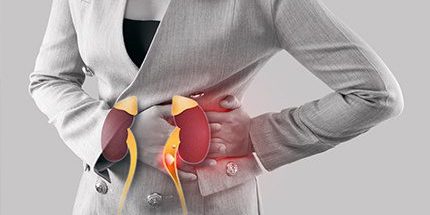Ever heard about Kidney Stones?
If you haven’t heard about their occurrences, they are more common than we think. If you’ve ever had them, you know how painful and terrible they can be. Understanding what to expect is vital if you’ve never faced this situation. Not everyone gets kidney stones, and even those who do sometimes don’t feel pain.
We’ve compiled this information on kidney stones and the dietary precautions that need to be observed for self-care and your near ones so that you can be ready and gain a better grasp of the underlying reason.
What actually are Kidney Stones?
The kidneys- two bean-shaped organs that are situated on either side of the spine, directly below the rib cage. Kidneys filter the waste and excess water out of the bloodstream to produce urine. Urine leaves the kidneys and travels via two thin tubes called ureters before entering the bladder.
The kidneys regulate the levels of water, salt, and minerals in your blood in addition to filtering waste. When urine contains large amounts of minerals, urolithiasis, the medical word for kidney stones, develops.
Kidney stones may form when urine becomes oversaturated with stone-forming chemicals, most frequently calcium and oxalate. The crystals can form masses of various sizes and forms to harden together when they aren’t diluted enough with fluid.


Maintaining hydration is crucial to prevent the crystallization minerals from sticking together and becoming big stones. These stones won’t hurt the urinary tract as long as they are found early and passed.
Types of Kidney Stones :
Kidney stones range in size and shape, with some tiny than a sand grain and others the size of a pebble and exist in various types. They can be divided into four fundamental kinds based on the minerals they are made of. Knowing the type you already have will reduce your risk of developing more.
- Calcium Oxalate stones
- Struvite stones
- Cystine stones
- Uric Acid stones
Calcium Oxalate stones:
They are the most prevalent kind of kidney stones that can develop and are formed due to the accumulation of calcium oxalate or calcium phosphate.
Oxalate, produced and released by the liver, is also present naturally in many foods. Numerous dietary factors, including foods with higher oxalate concentrations and intake of high doses of vitamin D, might cause calcium stones.
Struvite stones:
Struvite stones develop as a result of a particular infection, most commonly due to urinary tract infections, and are the rarest kinds of stones formed in the kidney. Due to their unpredictable nature and tendency for rapid growth, they can need surgery to be removed.
Cystine stones:
This type is associated with a hereditary disorder. In this disorder, the kidneys secrete exorbitant amounts of amino acids, known as “cystinuria,” in the kidneys and bladder. If there is a frequent occurrence of kidney stones, this disorder could be a reason for it.
Consult a homeopathic doctor to find out how to treat the disorder to prevent future recurrence.
Uric Acid stones:
It is another common type of kidney stone that can develop due to excessive uric acid levels in the urine. A diet rich in animal proteins can contribute to elevated uric acid in urine.
Dehydration, gout, and certain genetic factors also increase the risk of uric acid stones.
Symptoms of Kidney Stones:
A person who has experienced kidney stones will be able to identify the symptoms right away. But unfortunately, until the stone begins to move through the ureter, the probability of noticing the symptoms is low.
Usually, a stone that stays in the kidney and does not impede the urinary tract does not hurt. When investigating another problem, these stones are frequently discovered during imaging tests like an ultrasound or CT scan.
Sometimes, these stones may pass through the urinary system painlessly or without causing any discomfort. One of the symptoms a patient may experience when a stone becomes lodged and obstructs urine flow is the acute pain frequently associated with passing a kidney stone.
The other symptoms associated would be:
- Severe back and side pain just below the ribs.
- Lower-abdominal pain.
- Waves or varying intensity of pain.
- Urination discomfort.
- Urine with a foul odor.
- Nausea
- Vomiting
- Constant urge to urinate
- Fever or chills in case of infection.
How to prevent stone formation in the kidney?
Kidney stones pose a serious health concern if left untreated, but changes in diet lessen the risk of developing the stones in the first place.
- Drinking adequate water:
Lack of adequate water to flush the system is one of the most frequent causes of kidney stones. Drink additional water if you can. That should equate to 8 to 10 cups each day for most people.
- Switching to a healthy diet:
A high protein diet, such as red meat, poultry, eggs, and fish, can raise the kidney’s uric acid levels and lead to the formation of stones in the kidney.
- Reduce sodium intake:
Calcium is present in sodium. Kidney stones can develop due to the body accumulating too much salt and can be found in many canned, packaged, and fast foods. Additionally beneficial to blood pressure and cardiovascular health is a low-sodium diet.
- Controlling weight:
Maintain weight in check. Obesity could be linked to an increased risk of stones.
- Avoid colas:
Beverages that are high in fructose and phosphates may lead to stones in the kidney.
- Limit your intake of oxalates:
It is best to consume oxalates—organic compounds—in moderation. Oxalates readily bind to specific minerals, such as calcium, aiding kidney stone formation.
- Controlling the intake of calcium:
Consume adequate calcium through meals. Calcium in the proper amounts helps prevent other chemicals from entering the digestive tract and causing stones. However, consuming too much of it may make you more likely to develop calcium oxalate stones.
Lastly, increase the variety of nutrient-dense fruits and vegetables in your diet to help keep it balanced.
Treatment with Homeopathy for Kidney Stones:
People facing issues with any kidney stone-related condition can use homeopathic treatment for a better life. The natural components of homeopathic medications heal kidney stones’ underlying causes. The treatments successfully decrease the pain. The stones in the kidney are broken up and eliminated with urine, which eventually leaves the body and is eliminated. The medication is risk-free, all-natural, powerful, and has zero adverse effects.
For the past 20 years, Dr. Positive Homeopathy has worked to treat illnesses organically. Dr. Positive Homeopathy’s constitutional treatment aims to identify the underlying cause of the kidney issue and treat it with the best possible treatment.
Contact Dr. Positive Homepathy to get yourself treated for kidney-related issues.
To schedule a consultation at your neighborhood Dr. Positive Homeopathy, Contact us at +91 7337557851.








